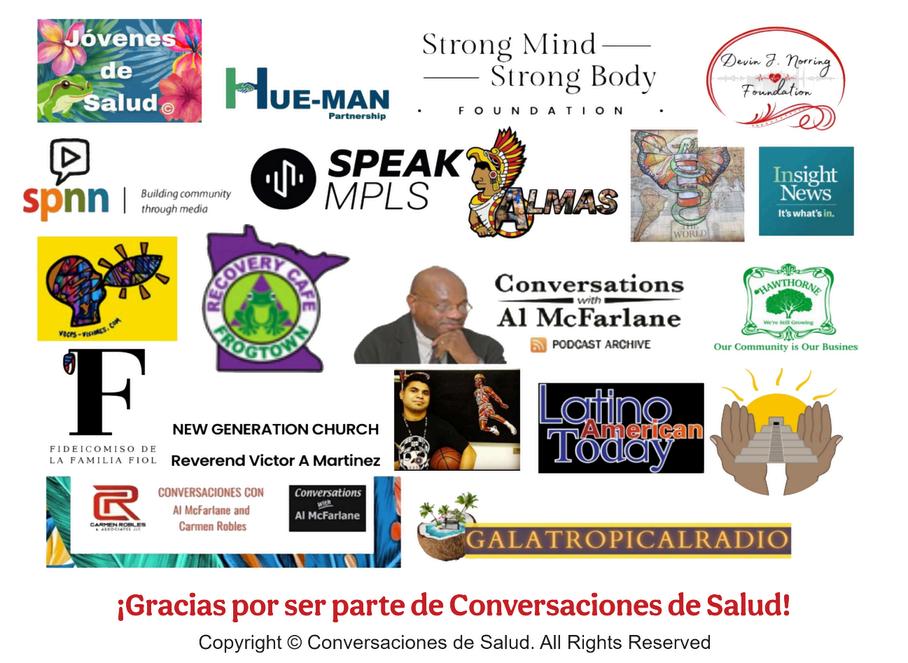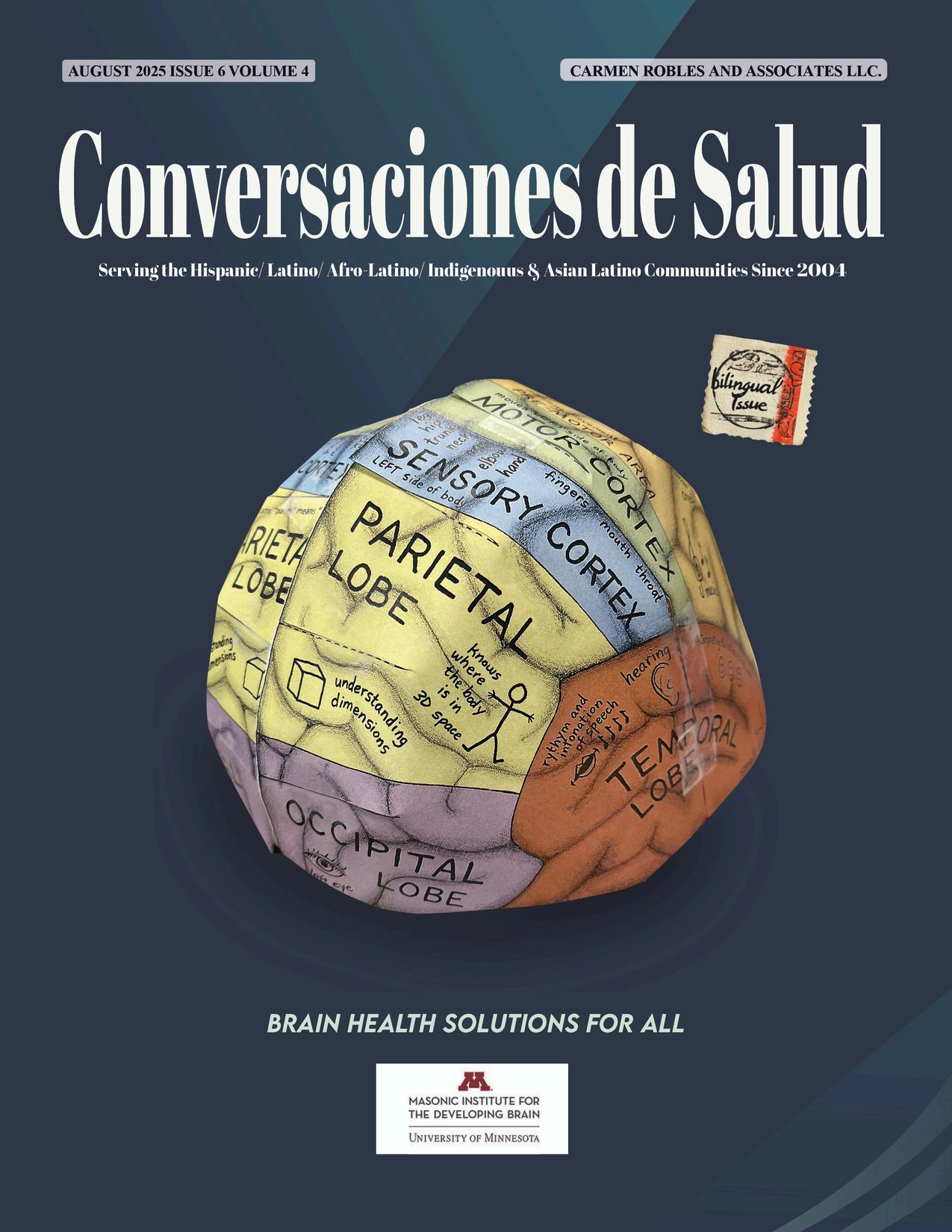

CONTENIDO
Serving the Hispanic/ Latino/ Afro-Latino/ Indigenouus & Asian Latino Communities Since 2001
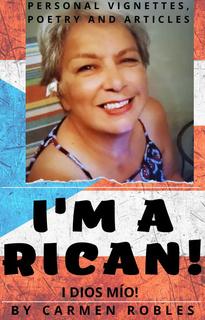
Carmen Robles CEO/Publisher
Jovenes de Salud Founder

Eric Ortiz, Ex. Director Strong Mind Strong Body Found-Youth Community Journalism Institute. Pages 14-19
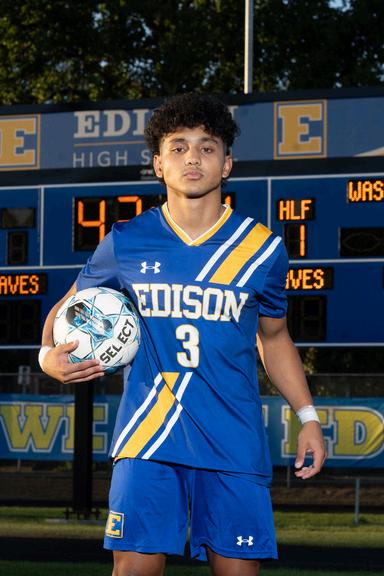
Jesus Rojas, *Youth Editor
*Junior Publisher
*Content Creator Pages 10-11

Cover Page Photo by
Elvin Rodriguez Pérez
7 grader and a 2025 SMSBFYouth Community Journalism Institute Graduate th

Cynthia Munguia MN Recovery Connection Pages 4-5
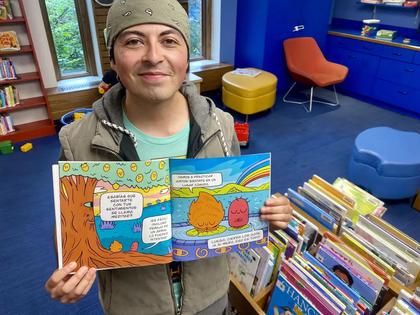
Rocky Casillas Aguirre Where did Anxiety Go Page 20
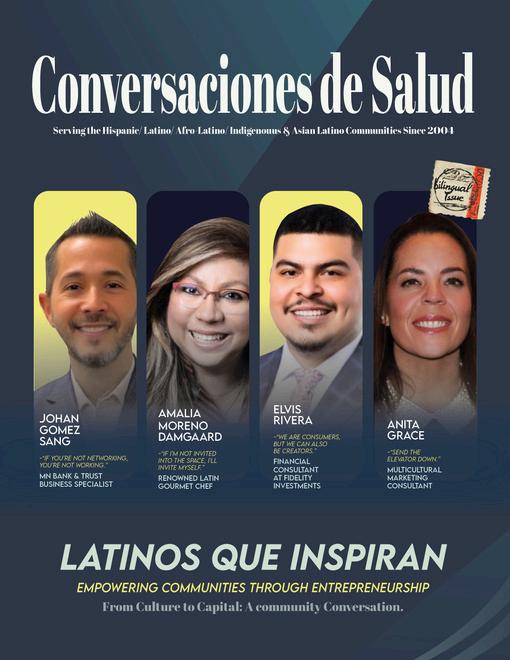
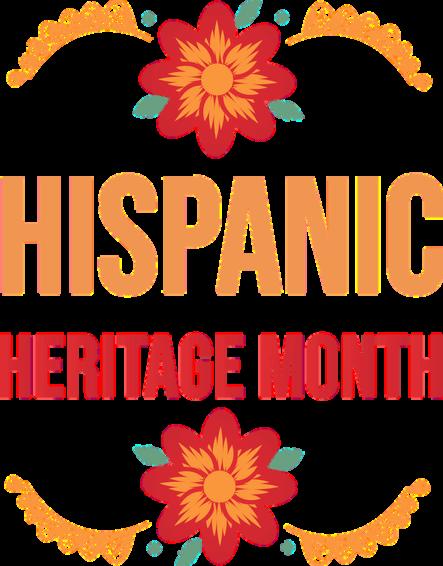

Latinos que Inspiran Page 6


Por: Bridgette Norring Devin Norring Foundation julio 17, 2025
¡La Ley Cooper Davis y Devin Norring ha sido reintroducida oficialmente! Este proyecto de ley bipartidista, que salva vidas, ayudará a detener la venta de pastillas falsificadas y medicamentos con fentanilo que están matando a miles de estadounidenses, muchos de ellos niños y jóvenes, a través de plataformas de redes sociales y aplicaciones en línea.
Queremos agradecer sinceramente a los senadores Roger Marshall y Jeanne Shaheen, junto con las congresistas Mariannette MillerMeeks y Angie Craig, por liderar este esfuerzo crucial en ambas cámaras del Congreso. La Ley Cooper Davis y Devin Norring no se trata de la extralimitación del gobierno ni de la censura, sino de responsabilizar a las empresas tecnológicas cuando se percaten del tráfico de drogas en sus plataformas.
Les da a las familias la oportunidad de luchar para detener la próxima tragedia. Nuestras familias conocen este dolor de primera mano. Perdimos a Cooper y a Devin por pastillas falsificadas. No queremos que ninguna otra familia pase por esto. Es hora de que este proyecto de ley llegue a su fin. La vida de nuestros hijos lo vale.
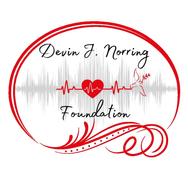
By: Bridgette Norring Devin Norring Foundation
July 17, 2025
The Cooper Davis and Devin Norring Act has been officially reintroduced! This life-saving, bipartisan bill will help stop the sale of counterfeit pills and fentanyl-laced drugs that are killing thousands of Americans—many of them kids and young adults—through social media platforms and online apps.
We want to sincerely thank Senators Roger Marshall and Jeanne Shaheen, along with Congresswomen Mariannette Miller-Meeks and Angie Craig, for leading this critical effort in both chambers of Congress. The Cooper Davis and Devin Norring Act is not about government overreach or censorship—it’s about holding tech companies accountable when they become aware of drug trafficking happening on their platforms.
It gives families a fighting chance to stop the next tragedy. Our families know this pain firsthand. We lost Cooper and Devin to counterfeit pills. We don’t want any other families to go through this. It’s time to get this bill across the finish line. Our kids’ lives are worth it.
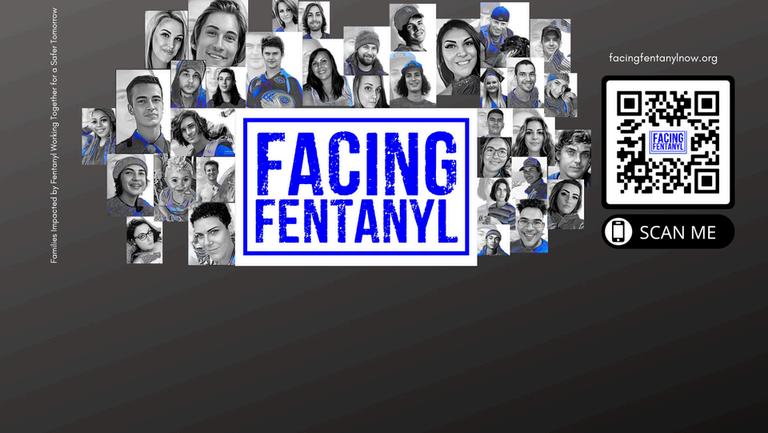

DAVID NORRING Foundation


Cynthia Munguia, Executive Director
SUEÑOS TAN SALVAJES COMO EL VIENTO: REFLEXIONES DE UNA MUJER EN RECUPERACIÓN
“Ser una persona en recuperación a largo plazo” es algo que escucho a menudo: en mi trabajo, mi entorno y mi comunidad. Pero no es solo una frase. Es parte de mi ser. Mi camino hacia la recuperación fue inesperado; nunca lo planeé, nunca lo soñé. Sin embargo, aquí estoy, viviendo una vida que antes no podía imaginar.
De joven, mis sueños eran vívidos y libres, salvajes como el viento y hermosos como los árboles verdes que me inspiran a escribir. Pero durante mucho tiempo, esos sueños se sintieron inalcanzables Mi infancia y adolescencia temprana estuvieron marcadas por experiencias que dejaron huellas profundas y duraderas; momentos que minaron mi sentido de valía y posibilidad. Me pregunté si me valoraban, si importaba o si había un futuro para alguien como yo. Sobreviví a muchas formas de uso y abuso.
El camino que recorrí fue difícil y, a menudo, solitario. Pero la recuperación, con toda su imperfecta belleza, me llevó a un nuevo camino. Y ahora, me encuentro en espacios a los que nunca pensé pertenecer, entre jóvenes latinos vibrantes y apasionados que reflejan tanto mi yo más joven.
Ser recibidos en su mundo ha sido una experiencia humilde. Estos jóvenes están eligiendo dar vida a sus comunidades. Abogan por sí mismos, por sus compañeros, por sus familias, con una claridad y una valentía que me conmueve. Y de alguna manera, han hecho espacio para mí, alguien con años de vida, batallas libradas e historias que contar.
Aunque no me considero "vieja", sin duda he tenido mis propias etapas: de caer y levantarse, de olvidar y recordar. En la recuperación, es fácil perder de vista de dónde venimos, del impacto que hemos tenido y del dolor que hemos causado.
Pero lo que sé ahora es esto: nuestras experiencias importan. No son algo que ocultar. Son puentes: conexiones reales y vividas con la próxima generación.
Hoy, mi corazón está lleno. Veo a nuestra juventud latina soñando, construyendo y creyendo en algo mejor. Los veo creando espacios para la sanación y la alegría, para la identidad y el propósito. ¿Y lo más hermoso? Puedo ser parte de eso.
Soy una mujer en recuperación a largo plazo. Llevo conmigo historias que una vez me pesaron, pero que ahora sirven como semillas de esperanza. He aprendido que la sanación es posible. Que la pertenencia es poderosa. Que nuestro pasado, por doloroso que sea, puede transformarse en propósito.
Al acompañar a esta nueva generación, honremos sus sueños: sueños tan salvajes como el viento y tan hermosos como los árboles verdes que florecen a nuestro alrededor.
Sobre la autora: Cynthia Munguia es una mujer en recuperación a largo plazo y actualmente se desempeña como directora ejecutiva de Minnesota Recovery Connection, donde trabaja para apoyar el empoderamiento juvenil y las iniciativas de recuperación comunitarias.
Con una profunda pasión por la mentoría y la narración de historias, está comprometida a ayudar a los jóvenes a encontrar su voz y propósito. Conéctate con ella en
https://www.linkedin.com/in/cynthiamunguia o correo electrónico a cynthia@minnesotarecovery.org


Cynthia Munguia, Executive Director
DREAMS AS WILD AS THE WIND: REFLECTIONS FROM A WOMAN IN RECOVERY
Being a person in long-term recovery” is something I hear often in my workplace, my environment, and my community. But it’s not just a phrase. It’s a part of who I am. My journey into the recovery field was unexpected; I never planned for it, never dreamed of it. Yet here I am living a life I once couldn’t imagine.
As a young person, my dreams were vivid and free, as wild as the wind and as beautiful as the green trees that inspire me to write. But for a long time, those dreams felt unreachable. My childhood and early teenage years were shaped by experiences that left deep and lasting marks—moments that chipped away at my sense of worth and possibility. I questioned if I was valued, if I mattered, or if there was a future for someone like me.
I survived many forms of use and abuse. The road I walked was difficult and often lonely. But recovery, in all its imperfect beauty, brought me to a new path. And now, I find myself standing in spaces I never thought I’d belong to among vibrant, passionate Latino youth who reflect so much of the younger me.
To be welcomed into their world has been nothing short of humbling. These young people are choosing to speak life into their communities. They’re advocating for themselves, for their peers, for their families with a clarity and courage that stirs my soul. And somehow, they've made room for me someone with years lived, battles fought, and stories to tell.
While I don’t consider myself "old," I’ve certainly had my share of seasons—of falling and rising, of forgetting and remembering. In recovery, it’s easy to lose sight of where we’ve come from, of the impact we’ve had, and of the pain we’ve caused.
But what I know now is this: our experiences matter. They are not something to hide. They are bridges real, lived connections to the next generation.
Today, my heart is full. I see our Latino youth dreaming, building, and believing in something better. I see them creating spaces for healing and joy, for identity and purpose. And the most beautiful part? I get to be part of that.
I am a woman in long-term recovery. I carry stories that once weighed me down, but now serve as seeds of hope. I’ve learned that healing is possible. That belonging is powerful. That our past, no matter how painful, can be transformed into purpose.
As we walk alongside this rising generation, may we honor their dreams—dreams that are as wild as the wind, and as beautiful as the green trees blooming all around us.
About the Author:Cynthia Munguia is a woman in long-term recovery and currently serves as Executive Director at Minnesota Recovery Connection where she works to support youth empowerment and community-based recovery initiatives. With a deep passion for mentoring and storytelling, she is committed to helping young people find their voice and purpose. Connect with her on:
https://www.linkedin.com/in/cynthiamunguia or email at cynthia@minnesotarecovery.org
https://minnesotarecovery.org
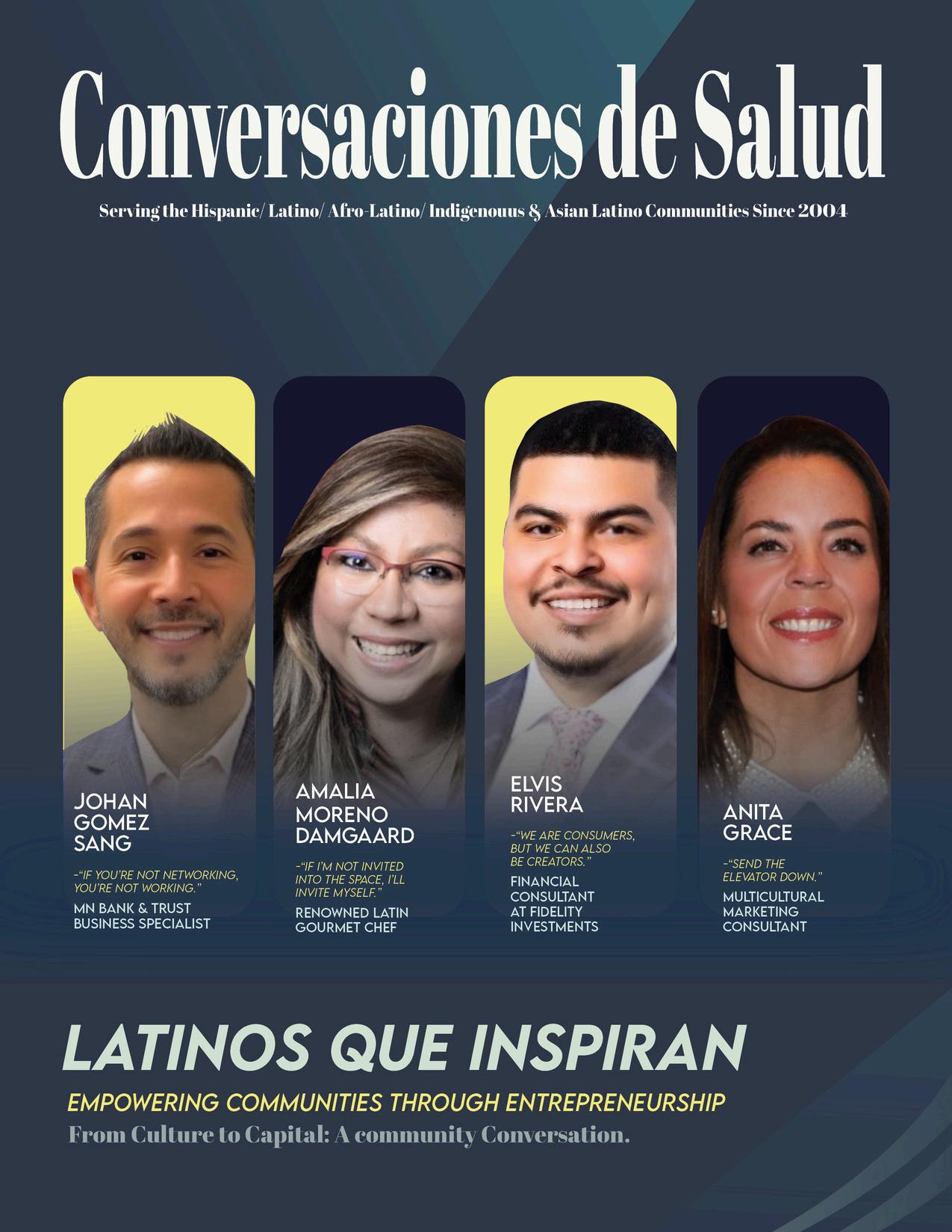

BOOKCLUBAUGUSTFEATURE
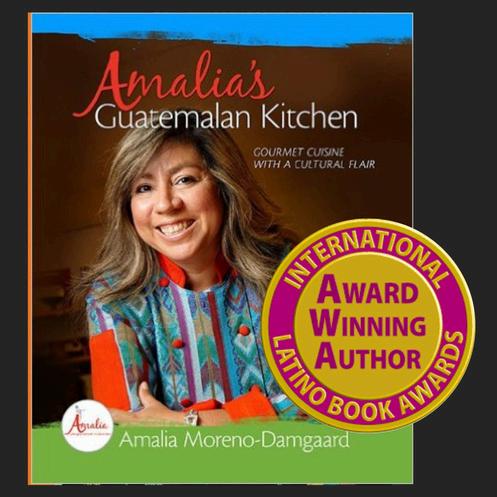
Nunca imaginé que mi amor por la cocina y la narración me llevaría a este punto. Cuando dejé la banca y escribí mi primer libro, dediqué mi corazón a cada página, no solo compartiendo recetas, sino también fragmentos de mi vida, mi cultura y las historias de las mujeres y tradiciones que me formaron. Saber que ya va por su cuarta edición me llena de humildad y me emociona profundamente.
Al viajar para investigar mi tercer libro, recuerdo por qué fundé Amalia Latin Gourmet: ayudar a organizaciones e individuos a conectar más profundamente a través de la comida y la cultura. Ya sea escribiendo, cocinando, asesorando o dando conferencias, la esencia de mi trabajo siempre es la misma: preservar las tradiciones a través de historias con corazón y propósito.
A través de mi negocio, doy vida a la inteligencia cultural en salas de juntas, aulas y cocinas, superando diferencias, fomentando el diálogo y creando experiencias que perduran mucho después del último bocado.
¡Gracias por su apoyo! Gracias por ser parte de este viaje. ¡Estoy deseando compartirles lo que viene!
¿Les interesa saber más sobre mis libros? Visiten mi tienda en https://amaliallc.com/store/
Amalia Latin Gourmet | Cultura a través de la Cocina #storytelling #innovation #culture #foodie #autho

I never imagined that my love for cooking and storytelling would lead me to this point. When I left banking behind and wrote my first book, I poured my heart into every page, not just sharing recipes, but sharing pieces of my life, my culture, and the stories of the women and traditions that shaped me. To know that it’s now in its fourth printing feels both humbling and deeply emotional.
As I travel to research my third book, I’m reminded why I started Amalia Latin Gourmet: to help organizations and individuals connect more deeply through food and culture. Whether I’m writing, cooking, consulting, or speaking, the core of my work is always the same: preserving traditions through stories with heart and purpose.
Through my business, I bring cultural intelligence to life in boardrooms, classrooms, and kitchens alike, bridging differences, sparking dialogue, and creating experiences that linger long after the last bite.
¡Gracias por su apoyo! ~ Thank you for being part of this journey. I can’t wait to share what’s next.
Interested in learning more about my books? Please visit my store at https://amaliallc.com/store/
Amalia Latin Gourmet | Culture Through Cuisine #storytelling #innovation #culture #foodie #author
RESEARCH 101
Roni Evans, DC, MS, PhD
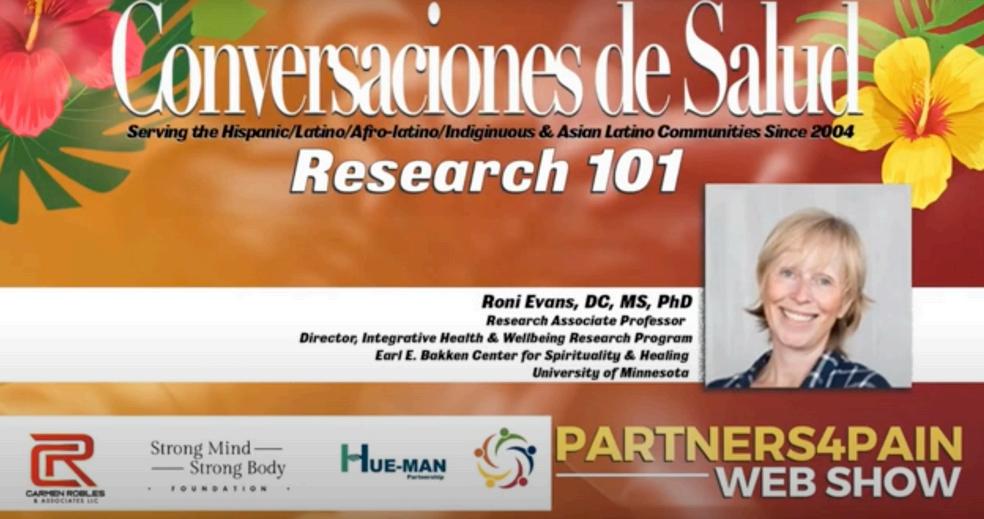
August `5, 2025 PARTNERS4PAIN Research 101
Welcome to Conversaciones de Salud: Research 101 with Dr Roni Evans
In our world today, where the pace of change can feel overwhelming and voices often go unheard, episodes like this one offer something rare and precious: clarity, connection, and community.
Dr. Roni Evans isn’t just sharing research she’s lighting a path forward. As a distinguished scientist in integrative health, her expertise brings wellness into focus through evidence-based understanding. But it’s not just about data; it’s about heart. Her work centers on healing holistically mind, body, and spirit and crafting research that reaches the communities who need it most. What makes this episode especially powerful is the way journalism and mentorship come together. By spotlighting Dr. Evans’s work, we’re not only sharing knowledge we’re showing young people that science, empathy, and cultural awareness can walk hand in hand
When youth see someone like Dr Evans passionate, knowledgeable, rooted in real lives they feel invited to believe in their own potential to inquire, lead, and care
PARTNERS4PAIN WEB SHOW
15 de agosto de 2025
PARTNERS4PAIN Research 101
Bienvenidos a Conversaciones de Salud: Investigación 101 con la Dra Roni Evans
En el mundo de hoy, donde el ritmo del cambio puede sentirse abrumador y tantas voces quedan sin ser escuchadas, episodios como este ofrecen algo raro y valioso: claridad, conexión y comunidad
La Dra Roni Evans no solo comparte investigación: ella ilumina un camino hacia adelante Como científica destacada en salud integrativa, su experiencia nos brinda una visión clara del bienestar a través de la comprensión basada en la evidencia. Pero no se trata únicamente de datos; se trata también del corazón. Su trabajo se centra en la sanación integral mente, cuerpo y espíritu y en diseñar investigaciones que lleguen a las comunidades que más lo necesitan.
Lo que hace que este episodio sea especialmente poderoso es la forma en que el periodismo y la mentoría se entrelazan. Al destacar el trabajo de la Dra. Evans, no solo compartimos conocimiento también mostramos a los jóvenes que la ciencia, la empatía y la conciencia cultural pueden caminar de la mano Cuando la juventud ve a alguien como la Dra Evans apasionada, sabia y conectada con la vida real se sienten invitados a creer en su propio potencial para investigar, liderar y cuidar
Así que acompáñanos Que esta conversación sea más que información: que sea inspiración Que despierte curiosidad, encienda un sueño y nos recuerde a todos que el periodismo con propósito no solo puede informar, sino también transformar
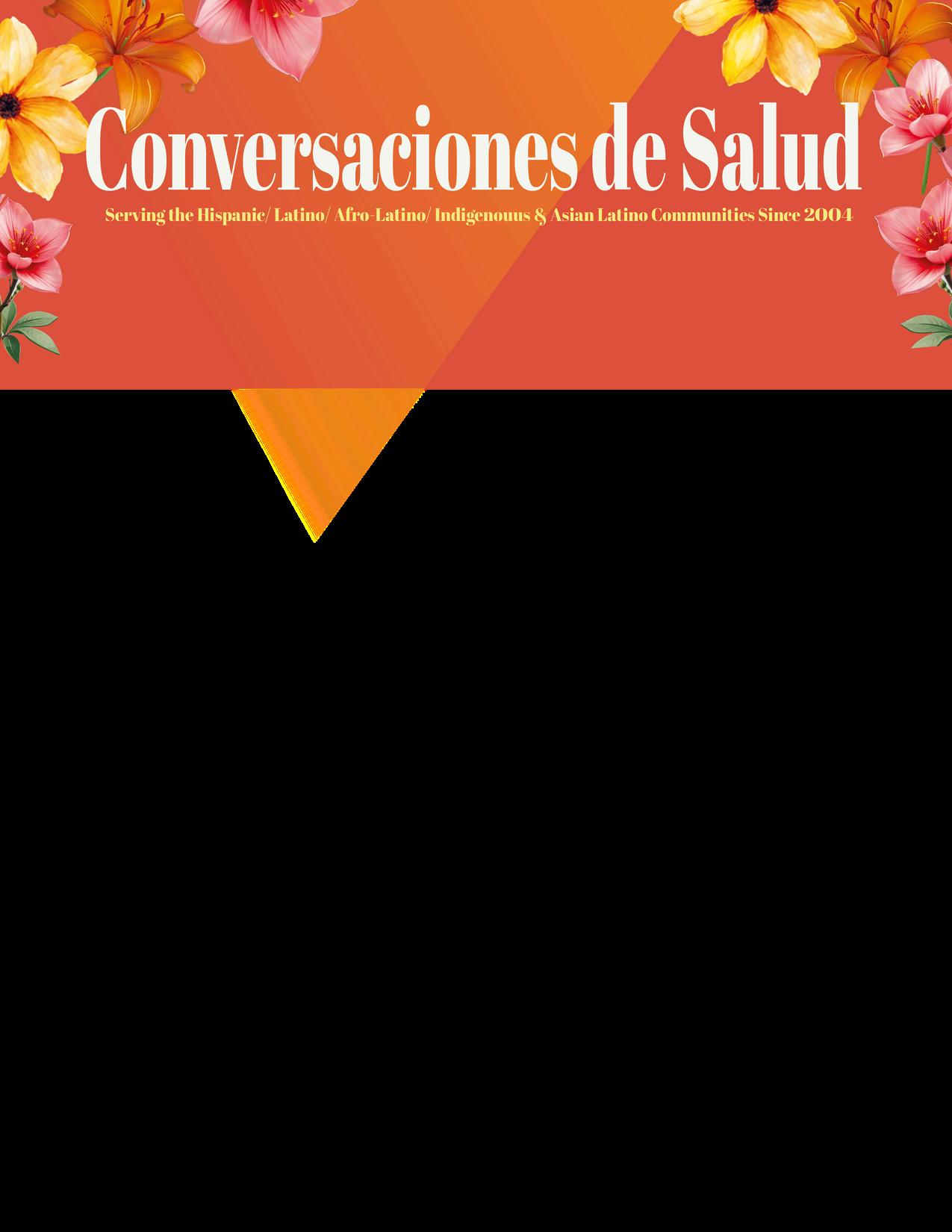
So, lean in with us Let this conversation be more than information let it be inspiration May it spark a curiosity, ignite a dream, and remind us all: that caring journalism can not only inform, but also transform

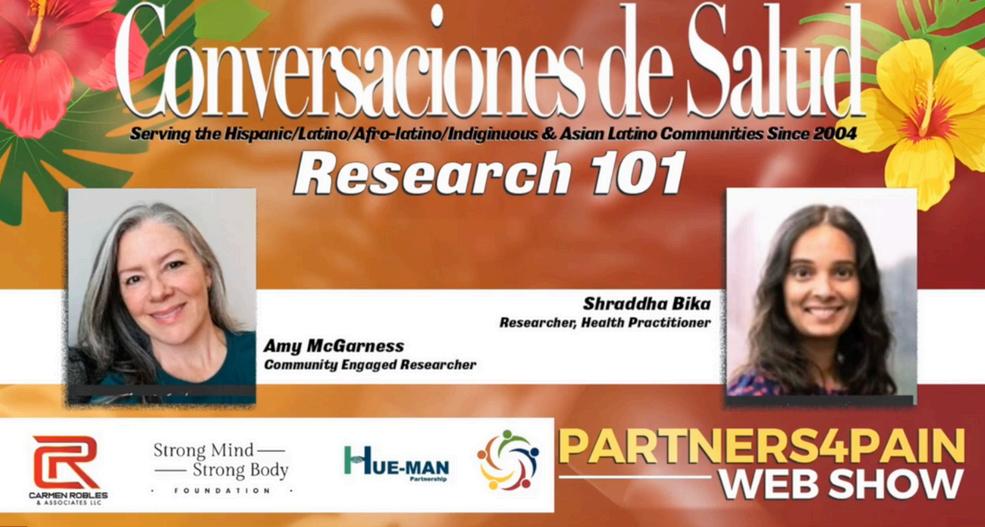
JULY 11, 2025 WEB SHOW
In this insightful broadcast,the Partners for Pain teamcame together to pull back thecurtainon what makes their workdifferent: adeepcommitment totrust, inclusivity, andcommunity-driven research Theconversation featured guests Amy, Shraddha, and Dougeach bringing a unique perspectiveon how meaningful, respectful, andeffective researchcan and should bedone.
DOUG KENNEDY
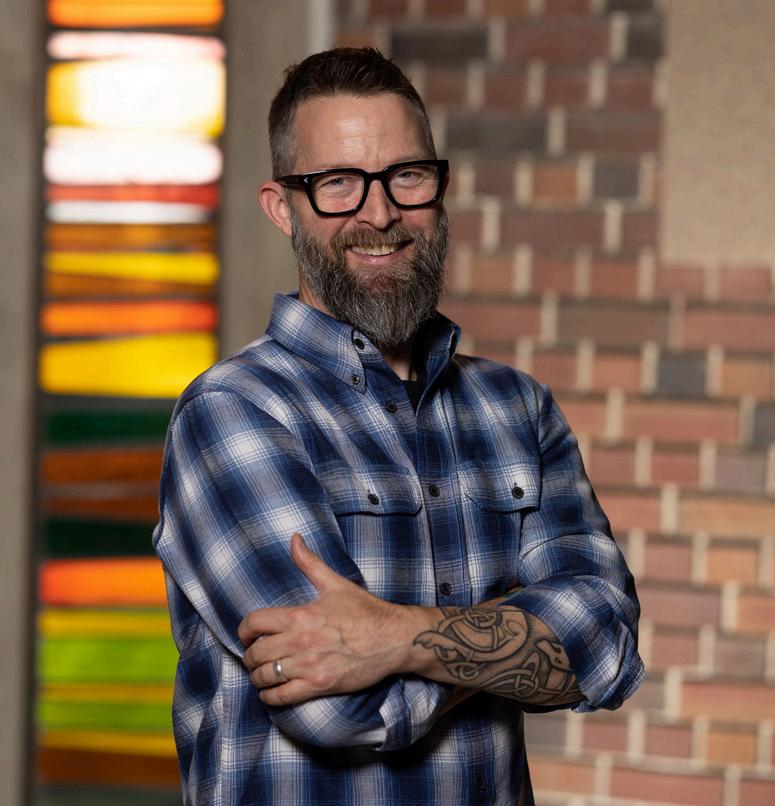
Emphasized the care taken to train staff and build safety into every interaction. He reflected on the longterm goal of inspiring future researchers to continue this kind of work. “If it’s going to continue, then we need to make sure this new group of researchers is constantly thinking about this and pushing the boundaries,”

RESEARCH 101
Enesta reveladoratransmisión,elequipodePartners for Pain sereuniópara revelar loquedistinguea sutrabajo:un profundo compromisocon laconfianza,la inclusióny la investigación comunitaria. Lacomunidadydefensora,laconversacióncontó con la participacióndeAmy,Shraddhay Doug,cada unocon una perspectiva única sobrecómosepuedey sedeberealizar una investigación significativa,respetuosayeficaz
Enfatizó el cuidado que se ha puesto en capacitar al personal e integrar la seguridad en cada interacción Reflexionó sobre el objetivo a largo plazo de inspirar a futuros investigadores a continuar con este tipo de trabajo. "Si vamos a continuar, debemos asegurarnos de que este nuevo grupo de investigadores esté constantemente pensando en esto y ampliando los límites".
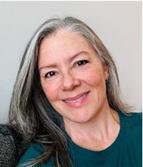
AMY MCGARNESS

A researcher and facilitator, brought clarity to the way Partners for Pain flips traditional research on its head Rather than starting with a hypothesis and testing it on people, the team starts by asking communities what they need and building the research with them “We may have the science, and the community has the insight. The answers are often more complex than what a researcher alone can come up with,”

Un investigador y facilitador aclaró cómo Partners for Pain revoluciona la investigación tradicional. En lugar de partir de una hipótesis y probarla con personas, el equipo empieza preguntando a las comunidades qué necesitan y desarrollando la investigación con ellas. «Podemos tener la ciencia, y la comunidad la perspectiva Las respuestas suelen ser más complejas de lo que un investigador puede aportar por sí solo»
Has facilitated both the Partners for Pain and Keys to Well-Being programs, offered a deeply human view into what makes the programs work While both programs are equally rigorous and impactful, what stands out most is how relationships are formed in the process “People don’t necessarily come in expecting to make good friends, but the pain unites people.”
Ha facilitado los programas "Compañeros para el Dolor" y "Claves para el Bienestar", ofreciendo una perspectiva profundamente humana sobre lo que hace que los programas funcionen Si bien ambos programas son igualmente rigurosos e impactantes, lo que más destaca es cómo se forjan relaciones en el proceso "La gente no necesariamente viene esperando hacer buenos amigos, pero el dolor une a las personas".
SHRADDHA BIKA
AMOR AL DÍA DE HOY

Hoy el amor parece haber cambiado de forma, o al menos la manera en que lo buscamos y lo vivimos. Antes, conocer a alguien implicaba tiempo, encuentros cara a cara, charlas que podían durar horas. Ahora, muchas veces, todo comienza y termina con un par de mensajes en el teléfono, un “match” en una app, y la ilusión de algo que puede ser o no.
Pero también está el ghosting, esa desaparición silenciosa que duele más de lo que uno espera. Cuando alguien con quien estabas hablando, con quien habías empezado a conectar, simplemente deja de responder. Sin avisar, sin una explicación. Y ahí te quedás, con mil preguntas y ninguna respuesta. Eso pasó a ser común, y la verdad, es que duele. Duele porque no te dan un cierre, y a veces ni siquiera sabés qué hiciste mal, o si fue algo tuyo.
Me he encontrado hablando con personas que me dicen: “Ya ni me sorprende cuando alguien desaparece. Es como normal”. Pero, ¿de verdad debería ser así? ¿Estamos a eso? Porque, si pensamos bien, ghostear es básicamente evitar la incomodidad, el enfrentamiento. Mejor cerrar la puerta sin ruido que decir “no quiero seguir hablando”. Pero, ¿qué aprendemos de eso? ¿Cómo hacemos para confiar o para abrirnos si en cualquier momento el otro puede irse?
Las apps de citas facilitaron mucho las cosas: conocer gente nueva, salir de tu círculo habitual, tener más opciones. Pero también trajeron la tentación de la inmediatez y la descartabilidad. “Si no me gusta, paso al siguiente”. Todo rápido, sin profundizar. Y eso, sin querer, afecta cómo nos relacionamos.
No es que todo sea negativo. He conocido personas increíbles gracias a estas apps, personas con quienes pude conectar de verdad. Pero también sé que para que una relación funcione, hace falta más que un match o un mensaje simpático. Hace falta paciencia, ganas de entender al otro, de atravesar silencios incómodos, de estar cuando no hay nada espectacular que decir.
La realidad es que el amor se volvió más complicado porque también nos cuesta estar con nosotros mismos, con la incertidumbre, con la vulnerabilidad. Ghostear, en el fondo, es una manera de protegerse del miedo al rechazo o a sentirse atrapado. Pero esa protección es frágil y al final nos deja más solos. Lo que creo que necesitamos ahora es volver a apostar por la honestidad, por la claridad, por decir lo que sentimos sin miedo. Y también aprender a aceptar que no todo tiene que ser perfecto, que el amor también es ese montón de pequeños momentos, algunos incómodos, otros maravillosos, pero siempre reales.
Al final, el amor en tiempos de apps y ghosting no tiene que ser una experiencia vacía o desechable. Puede ser, y debería ser, un espacio para crecer, para conectar de verdad. Solo hace falta un poco más de valentía para quedarse cuando otros prefieren irse.
Jesus Rojas
LOVE TODAY
Jesus Rojas
Today, love seems to have changed in form, or at least the way we seek it and experience it. Before, getting to know someone meant time, face-to-face encounters, conversations that could last for hours. Now, it often begins and ends with a couple of texts, a match on an app, and the hope of something that may or may not be.

But there's also ghosting, that silent disappearance that hurts more than you expect. When someone you were talking to, with whom you had begun to connect, simply stops responding. Without warning, without an explanation. And there you are, with a thousand questions and no answers. That's become common, and the truth is, it hurts. It hurts because you don't get closure, and sometimes you don't even know what you did wrong, or if it was something you did.
I've found myself talking to people who tell me: "I'm not even surprised when someone disappears anymore. It's like normal." But should it really be like that? Are we at that point? Because, if we think about it, ghosting is basically avoiding discomfort and confrontation. It's better to quietly close the door than to say, "I don't want to talk anymore." But what do we learn from that? How do we trust or open up if the other person could disappear at any moment?
Dating apps made things so much easier: meeting new people, leaving your usual circle, having more options. But they also brought the temptation of immediacy and disposability.

"If I don't like it, I'll move on to the next one." It's all done quickly, without going into depth. And that, unintentionally, affects how we relate to each other.
It's not that everything is negative. I've met incredible people thanks to these apps, people with whom I was able to truly connect. But I also know that for a relationship to work, it takes more than a match or a nice message. It takes patience, a desire to understand the other person, to navigate awkward silences, to be there when there's nothing spectacular to say.
The reality is that love has become more complicated because we also struggle with ourselves, with uncertainty, with vulnerability. Ghosting, at its core, is a way to protect ourselves from the fear of rejection or feeling trapped. But that protection is fragile and ultimately leaves us more alone.
What I think we need now is to return to honesty, to clarity, to saying what we feel without fear. And also to learn to accept that not everything has to be perfect, that love is also that multitude of small moments, some awkward, others wonderful, but always real.
In the end, love in the age of apps and ghosting doesn't have to be an empty or disposable experience. It can be, and should be, a space for growth, for true connection. It just takes a little more courage to stay when others prefer to leave..
CONOZCA MIDB
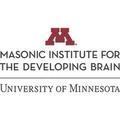
Del estudio al cuidado real para cerebros en desarrollo Damien Fair es codirector del Masonic Institute for the Developing Brain.
Como director del Instituto Masónico para el Desarrollo del Cerebro (MIDB, por sus siglas en inglés), con frecuencia escucho a padres, cuidadores y educadores que se sienten abrumados al intentar apoyar el desarrollo del cerebro de los niños. Justamente por eso creamos MIDB: para que este reto sea más comprensible, más accesible y, lo más importante, para que tenga un mayor impacto para las familias de nuestra comunidad.
Abramos nuestras puertas en 2021 en el antiguo edificio del Hospital Shriners, con una visión audaz y colaborativa. MIDB es mucho más que una clínica o un centro de investigación: es un espacio acogedor donde la atención clínica, la investigación de vanguardia y los programas comunitarios se unen bajo un mismo techo. Nuestra misión es sencilla pero poderosa: reunir el conocimiento de las comunidades y de la Universidad de Minnesota, con el fin de promover la salud del cerebro desde las primeras etapas del desarrollo y a lo largo de toda la vida.

Cuando las familias acuden a nosotros preocupados por el aprendizaje, el comportamiento, la ansiedad o el desarrollo social de sus hijos, muchas veces se sienten perdidas al tratar de navegar en sistemas complejos. En MIDB, hemos asumido la misión de hacer ese proceso más sencillo. Reunimos a pediatras, neurólogos, psicólogos, educadores e investigadores en un mismo espacio para trabajar en equipo. Usamos la ciencia y las herramientas más recientes con un solo objetivo: ahorrarles a las familias tiempo, viajes y estrés.
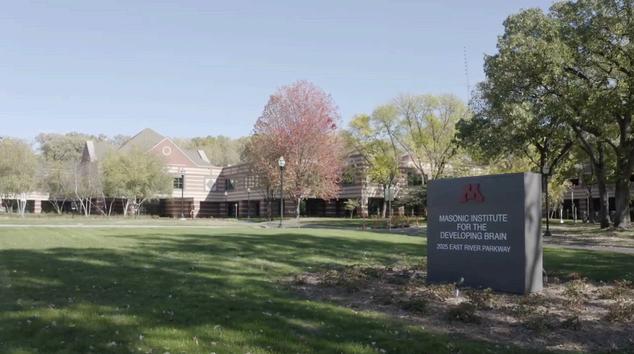
Tan importante como lo que hacemos dentro del edificio es cómo nos conectamos con la comunidad fuera de él. Creemos que la atención efectiva y la investigación con sentido no pueden ocurrir en aislamiento. Las alianzas con la comunidad son una parte fundamental de nuestro enfoque, ya que nos ayudan a asegurar que nuestro trabajo esté basado en experiencias reales y sea verdaderamente útil para las personas a las que queremos servir.
Nuestra investigación abarca una amplia gama de condiciones del desarrollo y de salud mental, incluyendo el autismo, el TDAH, la ansiedad, la depresión y muchos más Con herramientas avanzadas como la neuroimagen, estudiamos cómo crece el cerebro, cómo se adapta y cómo responde a distintas intervenciones. Lo que aprendemos en el laboratorio lo llevamos a la práctica lo antes posible, para que las familias reciban una atención basada en la mejor evidencia disponible.
Pero no nos detenemos en la clínica atención. El trabajo comunitario y la educación son pilares clave de nuestro trabajo. A través de talleres, desarrollo de materiales educativos y oportunidades de aprendizaje práctico, buscamos desmitificar el cerebro y fortalecer las capacidades de la comunidad para apoyar un desarrollo saludable. La intervención temprana es especialmente importante, y nos enfocamos en ayudar a padres, maestros y cuidadores a identificar señales de posibles dificultades durante la etapa en la que el cerebro es más flexible y receptivo.
MIDB es una colaboración: entre la Universidad de Minnesota y la comunidad, entre la ciencia y la experiencia vivida, y entre la esperanza y las soluciones reales. Nuestro trabajo se enfoca en fomentar un desarrollo saludable del cerebro a lo largo de toda la vida, comenzando desde las primeras etapas. Al unir una atención compasiva, investigación innovadora y un fuerte apoyo comunitario, trabajamos para transformar lo que es posible para niños y familias en Minnesota y más allá. Creemos que cuando las niñas y los niños son comprendidos, apoyados y empoderados, crecen y se convierten en personas adultas que fortalecen nuestras comunidades. Ese es el futuro por el que trabajamos todos los días.
.
GET TO KNOW MIDB

From Study to Actual Care for Developing Brains Damien Fair is Co-Director of the Masonic Institute for the Developing Brain.
As Director of the Masonic Institute for the Developing Brain (MIDB), I frequently hear from parents, caregivers, and educators who feel overwhelmed when trying to support their children's brain development. That's precisely why we created MIDB: to make this challenge more understandable, more accessible, and, most importantly, more impactful for families in our community.
We opened our doors in 2021 in the former Shriners Hospital building with a bold and collaborative vision. MIDB is much more than a clinic or research center: it is a welcoming space where clinical care, cutting-edge research, and community programs come together under one roof. Our mission is simple but powerful: to bring together the knowledge of communities and the University of Minnesota to promote brain health from the earliest stages of development and throughout life.

When families come to us concerned about their children's learning, behavior, anxiety, or social development, they often feel lost trying to navigate complex systems. At MIDB, we're on a mission to make that process easier. We bring together pediatricians, neurologists, psychologists, educators, and researchers in one space to work as a team. We use the latest science and tools with one goal: to save families time, travel, and stress.

Just as important as what we do inside the building is how we connect with the community outside of it. We believe that effective care and meaningful research cannot occur in isolation. Community partnerships are a fundamental part of our approach, helping us ensure that our work is grounded in reallife experiences and truly useful for the people we serve.
Our research covers a wide range of developmental and mental health conditions, including autism, ADHD, anxiety, depression, and many more. Using advanced tools like neuroimaging, we study how the brain grows, how it adapts, and how it responds to different interventions. We translate what we learn in the lab into practice as quickly as possible, so that families receive care based on the best available evidence.
But we don't stop at clinical care. Community outreach and education are key pillars of our work. Through workshops, the development of educational materials, and hands-on learning opportunities, we seek to demystify the brain and strengthen community capacities to support healthy development. Early intervention is especially important, and we focus on helping parents, teachers, and caregivers identify signs of potential difficulties during the stage when the brain is most flexible and receptive.
MIDB is a collaboration: between the University of Minnesota and the community, between science and lived experience, and between hope and real solutions. Our work focuses on fostering healthy brain development throughout the lifespan, starting from the earliest stages. By uniting compassionate care, innovative research, and strong community support, we work to transform what's possible for children and families in Minnesota and beyond.We believe that when children are understood, supported, and empowered, they grow into adults who strengthen our communities. That is the future we work toward every day.

Voces juveniles | Poder intergeneracional | Comunidades más fuertes
CELEBRATING CULTURE, COMMUNITY AND CONNECTION: AROUND THE WORLD ON LOWRY FESTIVAL UNITES NORTH MINNEAPOLIS
This story was written by Maliyani Cortes Quevedo, a youth journalist in the Strong Mind Strong Body Foundation-Youth Community Journalism Institute‘s 2025 summer program.
The streets of North Minneapolis came alive on Aug. 3 with a celebration of wonderful cultures at the “Around the World on Lowry” multicultural festival. Held at 3120 N Penn Ave. from 12 to 6 p.m., families, neighbors, and visitors gathered for a fun afternoon that blended global traditions with local pride, proving that community joy can be both vibrant and deeply meaningful.
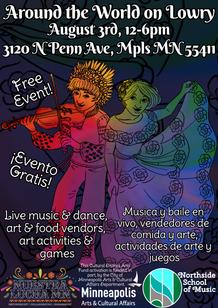
The Strong Mind Strong Body Foundation and its Youth Community Journalism Institute also hosted a table, led by youth community journalists from our summer microinternship program. Together with local residents, we created a community newspaper to tell the neighborhood’s story.
This free event brought together a rich blend of experiences, including live music, games, raffles, and traditional dance performances. Local vendors lined the street with handmade goods and delicious food from a variety of backgrounds.

The event, organized by the Nuestra Lucha MN nonprofit community empowerment organization, with support from the Minneapolis Arts and Cultural Affairs Department, highlighted the spirit of unity through diversity. From interactive art activities and fun games to insightful community booths and generous giveaways, Around the World on Lowry was a true celebration of the neighborhood’s strength and cultural richness.
Eric Ortiz is executive director of the Strong Mind Strong Body Foundation, a national youth and community development nonprofit based in Minneapolis In 2024, he launched the Youth Community Journalism Institute to strengthen communities through storytelling He also serves as associate director of research for The Pivot Fund, a venture philanthropy organization supporting community newsrooms in underserved areas, and writes a monthly column for the Southwest Connector, a local newspaper in Minneapolis

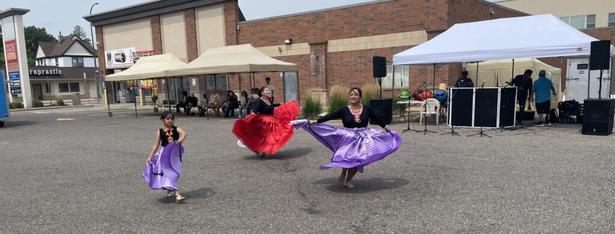



Donate

Voces juveniles | Poder intergeneracional | Comunidades más fuertes
CELEBRANDO LA CULTURA, LA COMUNIDAD Y LA CONEXIÓN: LA VUELTA
AL MUNDO EN EL LOWRY FESTIVAL UNE AL NORTE DE MINNEAPOLIS
Esta historia fue escrita por Maliyani Cortes Quevedo, periodista juvenil del programa de verano 2025 del Instituto de Periodismo Comunitario Juvenil de la Fundación Strong Mind Strong Body.
Las calles del norte de Minneapolis se llenaron de vida el 3 de agosto con una celebración de maravillosas culturas en el festival multicultural "La Vuelta al Mundo en Lowry". Celebrado en 3120 N Penn Ave. de 12:00 a 18:00 h, familias, vecinos y visitantes se reunieron para disfrutar de una tarde divertida que fusionó tradiciones globales con orgullo local, demostrando que la alegría comunitaria puede ser vibrante y profundamente significativa.

La Fundación Mente Fuerte, Cuerpo Fuerte y su Instituto de Periodismo Comunitario Juvenil también organizaron una mesa redonda, dirigida por jóvenes periodistas comunitarios de nuestro programa de microprácticas de verano. Junto con los residentes locales, creamos un periódico comunitario para contar la historia del barrio. Este evento gratuito reunió una rica mezcla de experiencias, incluyendo música en vivo, juegos, rifas y presentaciones de danza tradicional. Vendedores locales abarrotaron la calle con productos artesanales y deliciosa comida de diversas procedencias.
El evento, organizado por la organización sin fines de lucro de empoderamiento comunitario Nuestra Lucha MN, con el apoyo del Departamento de Artes y Asuntos Culturales de Minneapolis, destacó el espíritu de unidad a través de la diversidad. Desde actividades artísticas interactivas y juegos divertidos hasta puestos comunitarios con ideas innovadoras y generosos obsequios, la Vuelta al Mundo en Lowry fue una verdadera celebración de la fortaleza y la riqueza cultural del vecindario.
Eric Ortiz es el director ejecutivo de la Strong Mind Strong Body Foundation, una organización nacional sin fines de lucro dedicada al desarrollo juvenil y comunitario con sede en Minneapolis En 2024, lanzó el Youth Community Journalism Institute para fortalecer a las comunidades a través de la narración de historias También se desempeña como director asociado de investigación de The Pivot Fund, una organización de filantropía de riesgo que apoya a salas de redacción comunitarias en áreas desatendidas, y escribe una columna mensual para el Southwest Connector, un periódico local de Minneapolis

HAZ CLIC PARA LEER LAS COLUMNAS DE ERIC





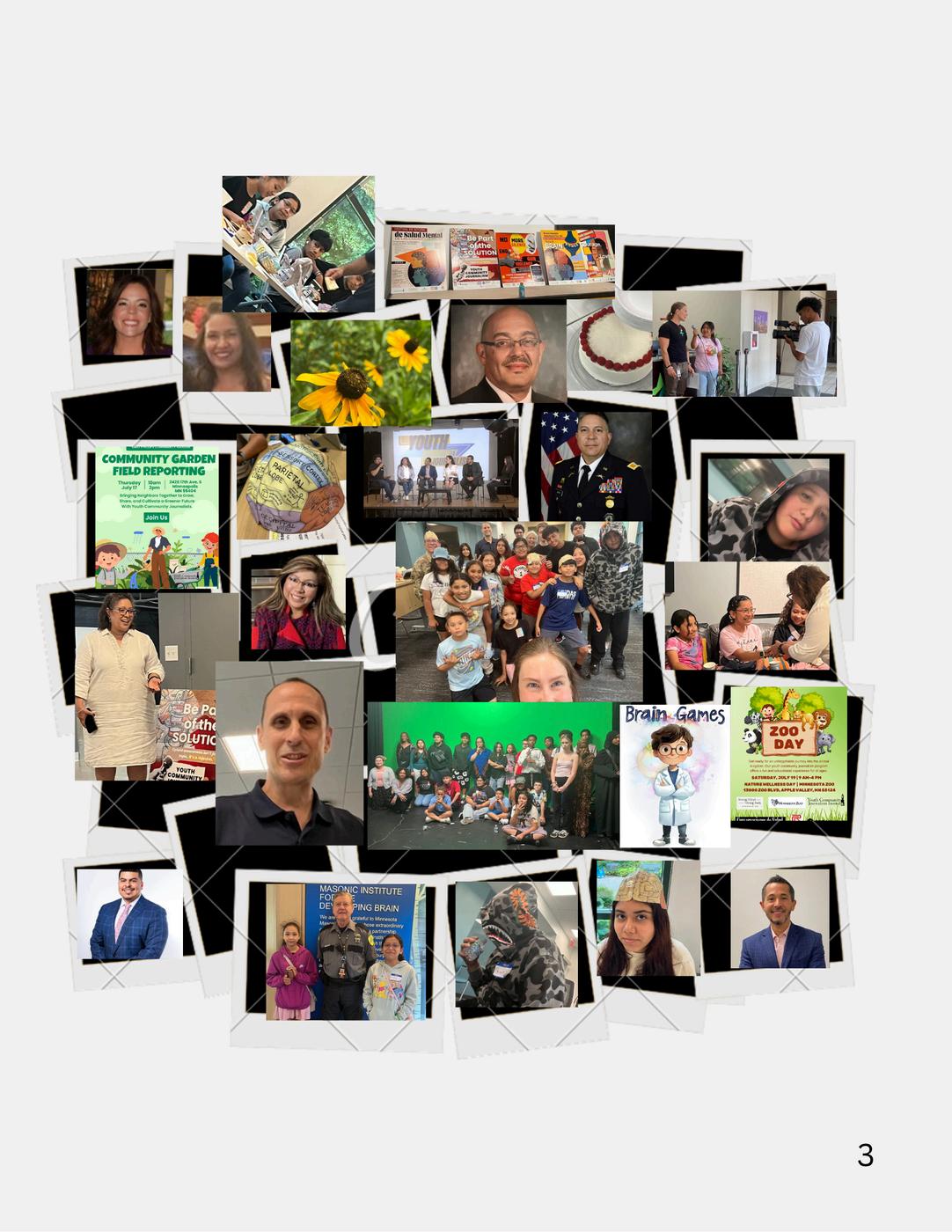
HIGHLIGHTS OF STRONG MIND STRONG BODY FOUNDATION - YOUTH COMMUNITY JOURNALISM INSTITUTE SUMMER 2025 PROGRAM

HIGHLIGHTS OF STRONG MIND STRONG BODY FOUNDATION - YOUTH COMMUNITY JOURNALISM INSTITUTE SUMMER 2025 PROGRAM
CONGRATULATIONS to STRONG MIND STRONG BODY FOUNDATION YOUTH COMMUNITY JOURNALISUM INSTITUTE
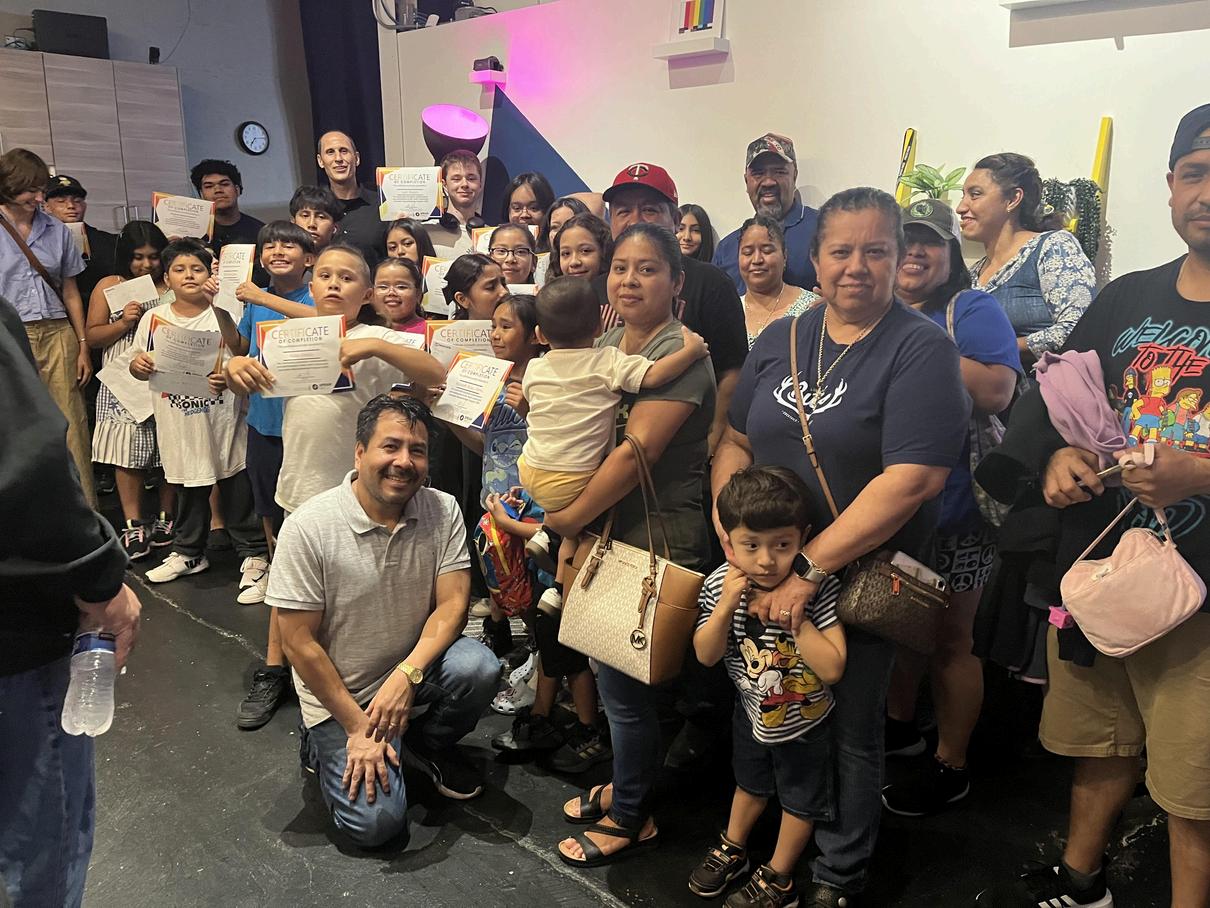
Building Solutions Together - Juntos Podemos Headlines often focus on challenges This episode invites us into stories of hope, innovation, and youth-led change right here in Minneapolis
From ages 8 to 17, these young reporters don’t just capture their community They build it With curiosity in hand and microphones at the ready, they tell real stories of how neighborhoods adapt, solve, and thrive
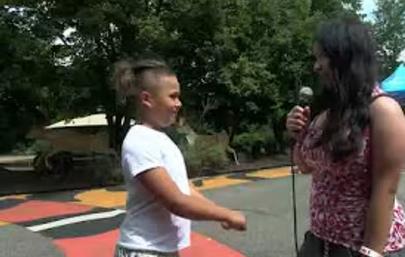
This is journalism with a purpose: a bridge between voice and action, between lived experience and informed response.
As we witness their work, we’re reminded that journalism isn’t just about conveying information. It’s about empowerment. For these kids, the camera isn’t just a tool. It’s a megaphone for their ideas, values, and dreams. They’re not just reporting on change—they’re becoming the changemakers themselves. So join us. Let these stories deepen our appreciation for the voices of youth, and let their courage inspire us all. Because in every clip, we’re reminded: journalism rooted in community is journalism that transforms.
FELICIDADES para STRONG MIND STRONG BODY FOUNDATION YOUTH COMMUNITY JOURNALISUM INSTITUTE
Construyendo Soluciones Juntos - Juntos Podemos

Los titulares suelen centrarse en los desafíos
Este episodio nos invita a adentrarnos en historias de esperanza, innovación y cambio liderado por jóvenes aquí en Minneapolis
De 8 a 17 años, estos jóvenes reporteros no solo capturan su comunidad, sino que la construyen. Con curiosidad y micrófonos listos, cuentan historias reales de cómo los vecindarios se adaptan, resuelven problemas y prosperan.

Este es periodismo con un propósito: un puente entre la voz y la acción, entre la experiencia vivida y la respuesta informada
Al presenciar su trabajo, recordamos que el periodismo no se trata solo de transmitir información, sino de empoderamiento. Para estos jóvenes, la cámara no es solo una herramienta. Es un megáfono para sus ideas, valores y sueños. No solo informan sobre el cambio, sino que se convierten en sus propios impulsores. Así que únete a nosotros.
Que estas historias profundicen nuestro aprecio por las voces de los jóvenes y que su valentía nos inspire a todos. Porque en cada clip, nos recuerdan: el periodismo arraigado en la comunidad es periodismo que transforma.
Addressing Mental Health
BOOK CLUB AUGUST FEATURE
COMIC BOOKS BY ROCKY
Cartoons, culture and care: Latino artist creates bilingual mental health universe
Rocky Casillas Aguirre with his book, “Where did Anxiety Go,” at the Northfield Public Library on July 16. The book is available in English, Spanish, Swahili and Somali.
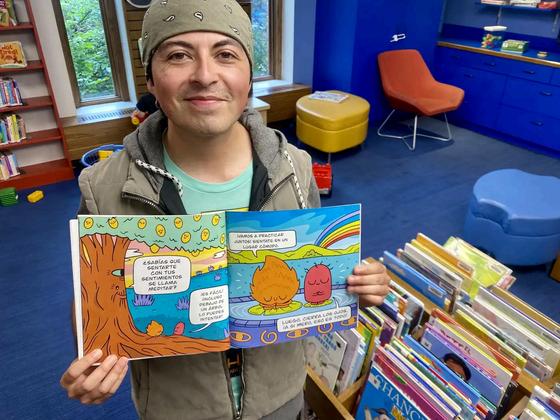
Rocky Casillas Aguirre with his book, “Where did Anxiety Go,”



Rocky will be at the Minnesota Comic Book Association annual "Fall Con" at the state fairgrounds October 11 & 12, 2025 https://www.mncba.org




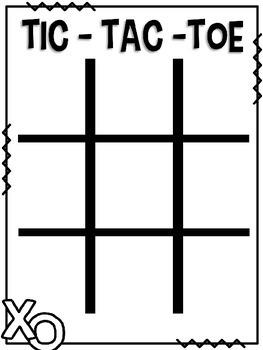

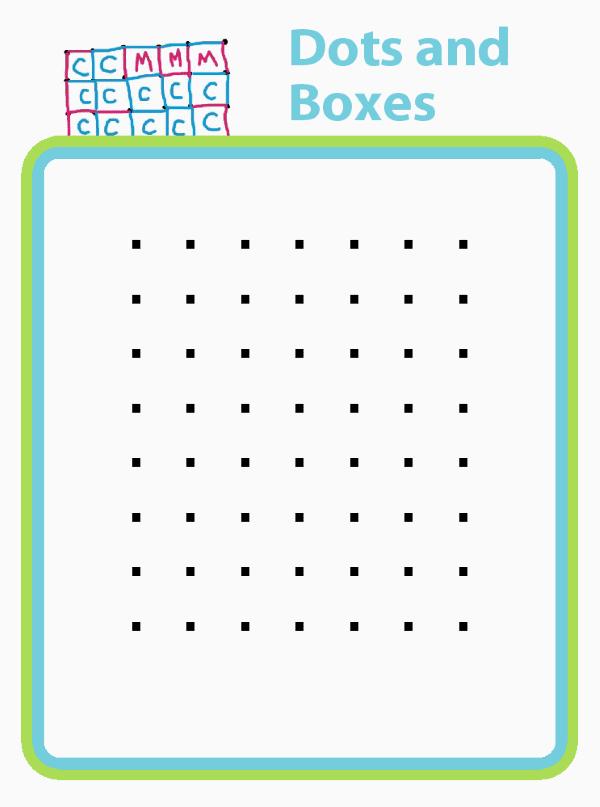
Box game

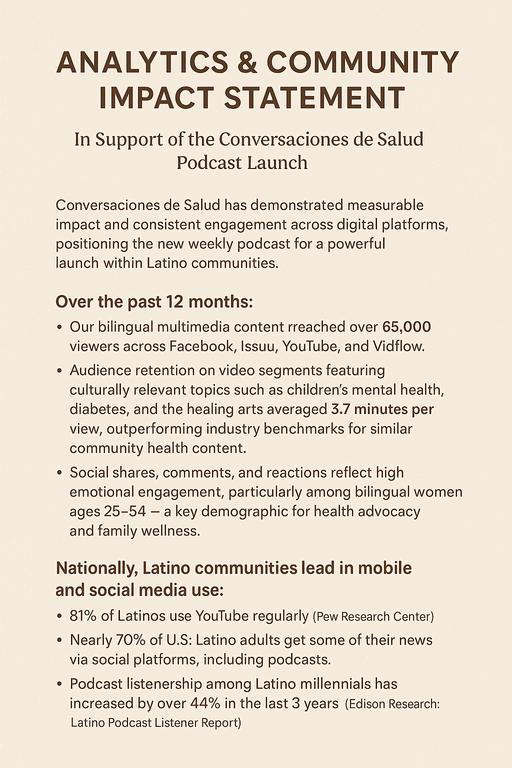
Coming in September





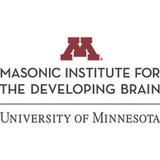



Gracias por acompañarnos en esta edición de agosto, donde celebramos las voces, luchas y logros de los emprendedores latinos


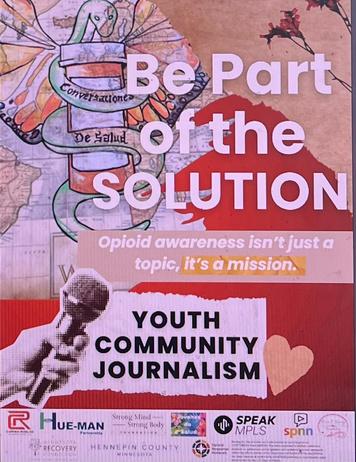

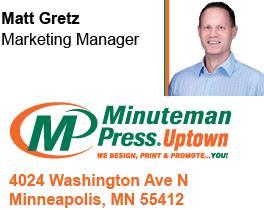

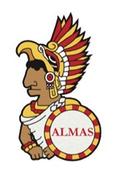
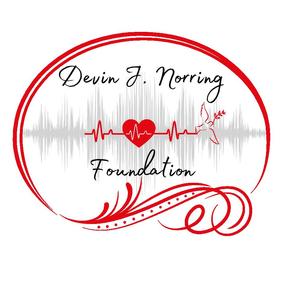

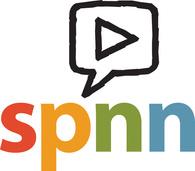

Este número nos recordó que el emprendimiento no es solo una vía económica, sino una herramienta de transformación cultural, emocional y comunitaria
Thank you for joining us in this August issue, where we celebrate the voices, struggles, and achievements of Latino entrepreneurs
This edition reminded us that entrepreneurship is not just an economic path, it’s a cultural, emotional, and community-driven transformation tool

